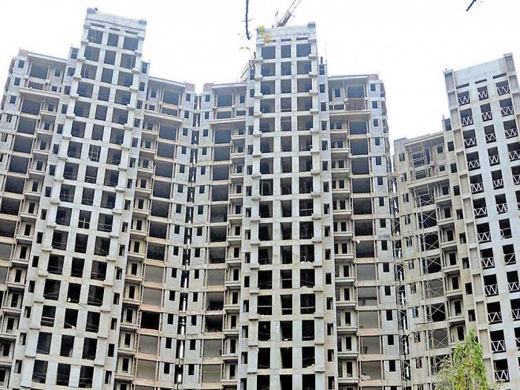Govt likely to simplify building plan approval
Mangalore Today News Network
Bengaluru, Aug 2 2017 DH: After much dilly-dallying, the state government has initiated steps to simplify the process of building plan approval. The Urban Development Department has published the draft Karnataka Municipal Corporations Common Building Bye-Laws 2017, which proposes self-certification of building plans. In other words, a certified professional - architect, engineer or structural consultant - will be able to issue clearances to start construction of low-rise residential and industrial buildings.

This is one among many reforms the government has planned through bye-laws, the draft of which dated July 11, was up for public scrutiny. If approved, they will be applicable to 11 city corporations across the state, including Bruhat Bengaluru Mahanagara Palike.
The government wants to streamline the process of building plan approvals to enable ease of doing business. Simplifying building plan approvals is part of model building bye-laws circulated by the Centre to all states last year.
According to the draft bye-laws, all civic bodies will have to put in place an online system so that submission of application and approvals are done virtually. Approval from other agencies has to be integrated with the online system through a common application form. “The system will help because getting a building plan approved is a very time-consuming process and people face harassment,” Additional Chief Secretary (Urban Development) Mahendra Jain said.
Onus on owner, certifier
A residential building with ground floor plus three floors (G+3) on a plot measuring not more than 500 sq m and an industrial building less than 15 metres in height on a plot up to 350 sq m qualify for self-certification. All one has to do is submit documents and pay the fee to the civic body. “One need not go to local bodies for plan approvals,” Jain said.
The building owner and the certified professional will be held responsible for any violation found during scrutiny later, as per the draft. The self-certification will be applicable to low-rise units to begin with. “We will consider extending this to high-rises if the system works well,” he said.
Also, the process will be fast-tracked by risk-based categorisation of building proposals.
For instance, a G+5 floors residential building will be considered ‘high risk’ and its plan will be approved by the civic body only after full scrutiny. The draft also lays down specific timelines for local bodies to issue building approvals, ranging from 10-30 days depending on the risk classification of buildings. The process takes anywhere between 30 and 180 days at present.
Integrated approach
Clearances from at least six agencies - National Monuments Authority, Environment ministry, Defence ministry, Coastal Zone Management Authority, National Highways Authority of India and Railways - will be integrated with the zoning regulations of Master Plans, which authorities hope will simplify the process further.
Urban architect Naresh V Narasimhan lauded the self-certification idea. “But how do authorities plan to identify and act upon violations,” he wondered.
- Manipal: Train passengers bag of valuables stolen
- Mulki: Missing auto driver found dead in well
- HYDGEN Innovation Day 2025 held at Sahyadri Campus
- IMD predicts thunderstorm for the next few days in coastal Karnataka
- Congress govt. has neglected coastal Karnataka, charges Vijayendra
- Kundapura: Grocery shop gutted in fire, losses exceed ₹4 lakh
- Puttur: 2 Hindu activists arrested for posing with machetes, posting photo in social media
- Udupi: Two sisters missing in Hiriyadka
- Udupi: 27 stolen mobile phones recovered, handed over to owners
- Mangaluru: Car goes out of control, climbs on divider near Nanthur
- 30 injured as KSRTC bus crashes into a house in Chikkamagaluru
- MoS for Railways, Somanna to flag off extended Subrahmanya Road passenger service on April 12
- Prices of over 50 commodities surged after Siddaramaiah became CM, alleges Vijayendra
- US suspends additional 26% tariff on India till July 9: White House
- This is my ground: KL Rahul’s aggressive celebration after DC’s win goes viral
- Karnataka govt immersed in 80% corruption: B Y Vijayendra
- Congress to hold protest against Centre on price rise
- 26/11 attacks shocked entire world; America supports India’s pursuit of justice
- Menstruating Dalit student made to take exams outside class in Tamil Nadu
- Darshan ignites new controversy by attending film premiere during ongoing legal dispute
- Apple airlifts 600 tons of iPhones from India ’to beat’ Trump tariffs: Report
- 300 students have had US visas revoked and could face deportation: Report
- Robbers break into ATM, decamp with Rs 18L cash in Kalaburagi
- 10 days before daughter’s wedding, UP woman elopes with would-be son-in-law
- PM Modi pays tribute to Mahavir on his birth anniversary
- Skills and Competencies Take Center Stage at MSN Dialogue Series
- Court remands Maoist Lakshmi to six-day police custody
- Sandhya Shenoy honored with Society for Materials Chemistry Medal-2024
- White Cornus Apartment in Mangaluru
- City girl wins first place in state-level spell bee competition
- Alleged ‘Love Jihad’ Case in Mangaluru: Woman left home voluntarily, says police
- Girl fatally struck by reckless two-wheeler near Belman
- New residential complex for the judges inaugurated in Mangaluru
- Absconding accused nabbed after 8 years
- Truck with cylinders turns turtle in Beltangady
- Bhoota Kola artist dies of cardiac arrest
- Development of the country should be our goal: Ganesh Karnik
- Container truck gets stuck under Modankap railway bridge
- Truck crushes bike’s pillion rider near BC Road
- Head constable dies of heart attack
- CITY INFORMATION
- TRAVEL
- TOURIST INFORMATION
- HEALTH CARE
- MISCELLANEOUS




 Write Comment
Write Comment E-Mail To a Friend
E-Mail To a Friend Facebook
Facebook Twitter
Twitter  Print
Print 


